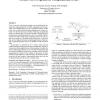Free Online Productivity Tools
i2Speak
i2Symbol
i2OCR
iTex2Img
iWeb2Print
iWeb2Shot
i2Type
iPdf2Split
iPdf2Merge
i2Bopomofo
i2Arabic
i2Style
i2Image
i2PDF
iLatex2Rtf
Sci2ools
101
click to vote
PPOPP
2006
ACM
2006
ACM
Mobile MPI programs in computational grids
Utility computing is becoming a popular way of exploiting the potential of computational grids. In utility computing, users are provided with computational power in a transparent manner similar to the way in which electrical utilities supply power to their customers. To take full advantage of utility computing, an application needs to be mobile; that is, it needs to be able to migrate between heterogeneous computing platforms while it is executing. Further, it needs to be able to adapt to the computing resources at each site, such as the number of available physical processors. At present, there are few high-performance computing applications of this sort, and re-engineering legacy codes to be mobile can take enormous effort. In this paper, we describe the PC3 system, which converts C/MPI codes into mobile programs almost transparently. Because it is based on portable application-level checkpointing, it enables the state of running applications to be saved so that the application can ...
Distributed And Parallel Computing | Heterogeneous Computing Platforms | PPOPP 2006 | Utilities Supply Power | Utility Computing |
Related Content
| Added | 14 Jun 2010 |
| Updated | 14 Jun 2010 |
| Type | Conference |
| Year | 2006 |
| Where | PPOPP |
| Authors | Rohit Fernandes, Keshav Pingali, Paul Stodghill |
Comments (0)

